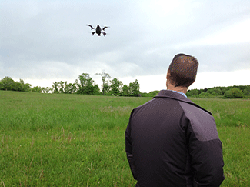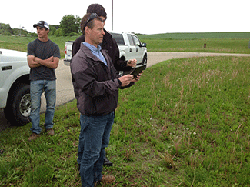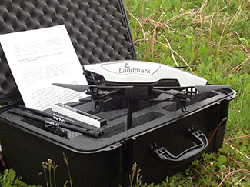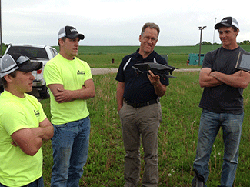
Agronomists at Landmark Services Cooperative can now use tablet-controlled drones to evaluate fields; technology reduces scouting time by 60 percent.
 The period of time between planting and pollination is the most critical for crop success. During this time period growers have the opportunity to make changes to their cropping strategy based on plant conditions. Information gathered through field scouting is used to make these adjustments. To improve the information available to farmers, the agronomy team at Landmark Services Cooperative has added a new tool to their scouting program. A new tablet-controlled drone is now available to help detect problems and prevent them before they occur.
The period of time between planting and pollination is the most critical for crop success. During this time period growers have the opportunity to make changes to their cropping strategy based on plant conditions. Information gathered through field scouting is used to make these adjustments. To improve the information available to farmers, the agronomy team at Landmark Services Cooperative has added a new tool to their scouting program. A new tablet-controlled drone is now available to help detect problems and prevent them before they occur.Landmark added the drone, a small forward-propelled helicopter with a built-in camera, to their toolbox at the beginning of the 2013 growing season. The agronomy team flies the drone above fields and is able to capture 360 degree aerial views to quickly detect any disease or nutrient deficiency issues in the crop.
Dan Moehn, vice president of Landmark Agronomy, says the tool provides a new and efficient viewpoint to the team's field scouting program.
"Whenever you see a field from a different perspective, you're able to pick up new information," he says. "If you're standing at the end of a corn field, you have one perspective but, when you get in the air, you can see a much larger view of the field and can quickly spot areas that need attention."
Agronomists traditionally scout fields by walking the length of the acreage and looking for problems a process that may allow for areas to be missed or additional time spent. Moehn estimates that the drone provides about a 60 percent time savings and a more complete view of the field.
The drone is controlled with a tablet. The agronomist lifts the tablet or tilts it down to direct the drone until it reaches a height between 75 and 100 feet. The agronomist then stops the drone and spins it 360 degrees to secure a full aerial view. At a height of 100 feet, the drone can capture nearly 20 acres. The drone captures footage in both video and photograph format and sends it to the tablet controller.




"We look at that footage and evaluate the field, looking for any problem spots," Moehn says. "If we see an area of crop that has signs of a disease or nutrient deficiency, we can then walk to that area of the field and take a closer look.
"We're looking for early symptoms of disease pressure, nutrient deficiency or injury from insects," he explains. "Typically, dark green plants are the healthiest. If the plant is showing signs of yellowness, it may be suffering from a nutrient or disease issue that needs further investigation."
The Landmark agronomists rely on their education and experiences to make recommended changes in fertilizer, pesticides or other field supplementation. The team also utilizes Landmark Agronomy's tissue sampling program for additional answers. When a plant is in question, a piece of the leaf is collected and sent into a lab for analysis. The lab technicians can determine possible nutrient deficiencies or disease risk.
"We can get the results back quickly enough to make a change and promote a good yield," Moehn says. "Now through pollination is the most critical time for plant development; if we find a problem, we can still make an effort to change things. When it gets later in the season, it becomes much less likely that you'll be able to fix a problem."
Moehn encourages growers to scout their fields at least weekly and to have an agronomist scout the field bi-weekly through pollination and monthly through harvest.
"The more scouting we can do, the more probable it is that we'll see problems before they become bigger than they need to be," Moehn says. "Preventing problems in the field is especially beneficial in a market where every bushel counts."
For more information on field scouting and crop planning, contact Dan Moehn at (608) 225-0359 or Daniel.Moehn@landmark.coop or visit www.landmark.coop.
Landmark Services Cooperative is a member-owned cooperative business dedicated to providing both rural and urban customers the highest quality products and services. For more than 80 years, Landmark has been providing agronomy, energy, animal nutrition, grain, retail and transportation products and services to its more than 15,000 members in South Central Wisconsin and Northern Illinois. Employing nearly 500 people in rural areas and reaching sales in excess of $570 million, Landmark provides the benefits of volume buying and access to state-of-the-art technology to its members while maintaining a hands-on, customer service-oriented approach in each of the communities we serve. For more information, visit www.landmark.coop or call 1-800-236-3276.
7.1.2013